Related Research Articles
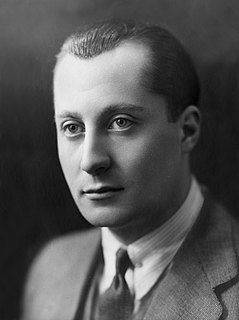
José Antonio Primo de Rivera y Sáenz de Heredia, 1st Duke of Primo de Rivera, 3rd Marquess of Estella, often referred to simply as José Antonio, was a Spanish politician who founded the fascist Falange Española, later Falange Española de las JONS.

José Calvo Sotelo, 1st Duke of Calvo Sotelo, GE was a Spanish jurist and politician, minister of Finance during the dictatorship of Miguel Primo de Rivera and a leading figure during the Second Republic. During this period he became an important part of Renovación Española, a monarchist movement. His assassination in July 1936 by the bodyguard of Socialist party leader Indalecio Prieto was an immediate prelude to the triggering of the military coup plotted since February 1936, the partial failure of which marked the beginning of the Spanish Civil War.
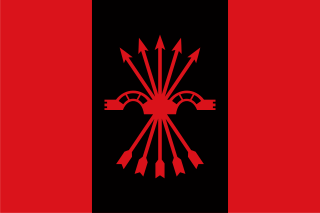
The Falange Española Tradicionalista y de las Juntas de Ofensiva Nacional Sindicalista, frequently shortened to just "FET", was the sole legal party of the Francoist regime in Spain. It was created by General Francisco Franco in 1937 as a merger of the Carlist, monarchist, and ultracatholic Traditionalist Communion with the fascist Falange Española de las JONS. In addition to the resemblance of names, the party formally retained most of the platform of FE de las JONS and a similar inner structure. In force until April 1977, it was rebranded as Movimiento Nacional in 1958.
Falange Española de las JONS is a Spanish political party registered in 1976, originating from a faction the previous Falange Española Tradicionalista y de las Juntas de Ofensiva Nacional Sindicalista. The word Falange is Spanish for phalanx. Members of the party are called Falangists. The main ideological bases of the party are national syndicalism, Third Position and ultranationalism.

Falange Española Independiente was a Spanish political party registered in 1977, originating from the Frente de Estudiantes Sindicalistas (FES), a student group of anti-Francoist falangists.

La Falange, also known as FE/La Falange, is a Spanish political party registered in 1999. The party originated as a split of the Falange Española de las JONS, led by Gustavo Morales and Jesús López. Ideologically the party claims to be a successor of the original Falange Española of the 1930s, and follower of the ideas of José Antonio Primo de Rivera, Ramiro Ledesma Ramos, Onésimo Redondo and Julio Ruiz de Alda.

Youth Front was a Spanish political youth organization and far-right militant group, sometimes considered a terrorist organization.
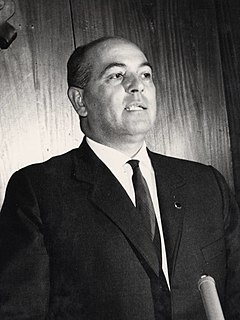
José Solís Ruiz was a Spanish politician, known for his role in Francoist Spain, during which he occupied a number of important posts.

Eduardo González Calleja is a Spanish historian, professor of Contemporary History at the Charles III University of Madrid (UC3M). He is the author of a long list of scholar works dealing with political violence.
José Luis Rodríguez Jiménez is a Spanish historian, considered an expert in the history of the right-wing extremism in Spain.
Gonzalo Álvarez Chillida is a Spanish historian. He has been referred to as the leading Spanish expert in the study of antisemitism in Spain.
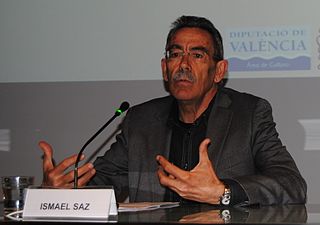
Ismael Saz Campos is a Spanish historian, specialised in the study of Falangism, Francoist Spain and the Spanish-Italian relations during the Spanish Civil War. He is a professor at the University of Valencia.

Alfonso García-Valdecasas y García-Valdecasas was a Spanish professor of civil law, lawyer, politician, and founding member of the Falange Española.
The Movimiento Español Sindicalista (MES) was a Spanish far-right political movement and predecessor of the Falange Española.
The history of the far-right in Spain dates back to at least the 1800s and refers to any manifestation of far-right politics in Spain. Individuals and organizations associated with the far-right in Spain often employ reactionary traditionalism, religious fundamentalism, corporate Catholicism, and fascism in their ideological practice. In the case of Spain, according to historian Pedro Carlos González Cuevas, the predominance of Catholicism played an essential role in the suppression of external political innovations such as Social Darwinism, positivism, and vitalism in Spanish far-right politics.
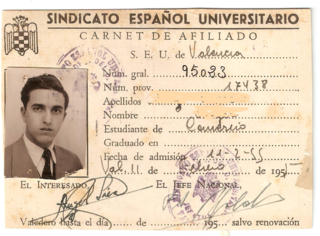
The Sindicato Español Universitario was a corporatist students' union in Spain, created in the 1930s during the Second Spanish Republic, by the Falange Española under the leadership of José Antonio Primo de Rivera. The SEU was inspired by students' unions linked to contemporary fascist parties of Italy and Romania.

Licinio de la Fuente y de la Fuente was a Spanish Francoist politician who served as Minister of Labour from 1969 to 1975. Promoter of the Democracia Social party during the Spanish Transition, he was one of the "Magnificent Seven", the seven political leaders who founded the federation of People's Alliance (AP) in 1976.
References
- 1 2 Casals Meseguer 2009, p. 238.
- 1 2 Rodríguez Jiménez 1994, p. 100.
- ↑ Payne 1987, p. 524.
- ↑ "Democracia y libertad, palabras fetiche para los partidos políticos en España". La Vanguardia . 22 November 2016.
- ↑ Casals Meseguer 2009, p. 242; Ruiz Carnicer 2013, p. 397.
- ↑ "Prensa hoy: Altos cargos de la Generalitat dan parte de su sueldo a Puigdemont". 3 March 2018.
- ↑ El frustrado agresor del Papa, en Fátima, un hombre brillante y vehemente
- ↑ Martínez, Luis (11 April 2014). "'Vivimos en un país fallido'". El Mundo .